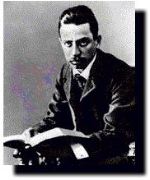The Man Watching
by Rainer Maria RilkeEnglish version by Robert Bly
Original Language German
I can tell by the way the trees beat, after
so many dull days, on my worried windowpanes
that a storm is coming,
and I hear the far-off fields say things
I can't bear without a friend,
I can't love without a sister
The storm, the shifter of shapes, drives on
across the woods and across time,
and the world looks as if it had no age:
the landscape like a line in the psalm book,
is seriousness and weight and eternity.
What we choose to fight is so tiny!
What fights us is so great!
If only we would let ourselves be dominated
as things do by some immense storm,
we would become strong too, and not need names.
When we win it's with small things,
and the triumph itself makes us small.
What is extraordinary and eternal
does not want to be bent by us.
I mean the Angel who appeared
to the wrestlers of the Old Testament:
when the wrestler's sinews
grew long like metal strings,
he felt them under his fingers
like chords of deep music.
Whoever was beaten by this Angel
(who often simply declined the fight)
went away proud and strengthened
and great from that harsh hand,
that kneaded him as if to change his shape.
Winning does not tempt that man.
This is how he grows: by being defeated, decisively,
by constantly greater beings.
<<Previous Poem | More Poems by Rainer Maria Rilke | Next Poem >>
View All Poems by Rainer Maria Rilke
Last night a tornado touched down just a few miles from where I live in Longmont, Colorado. The power of nature is sometimes majestic and terrifying, both!
And then an evening of being battered by rain and hail, with heavy thunder and lightning.
The experience gives particular resonance to the poem's lines:
The storm, the shifter of shapes, drives on
across the woods and across time,
and the world looks as if it had no age:
the landscape like a line in the psalm book,
is seriousness and weight and eternity.
It is as if the overwhelm of the storm both renews the world while, at the same time, having bestowed a serenity and ageless wisdom. Having survived the storm, the world has entered a deathless state.
One would think that Rilke's perspective in this poem would be crushing, with its observation that, through the simple act of living and growing, we face inconceivably immense forces arrayed against us. Forces that hardly notice us in their own massive movement. We are such vulnerable things ready to be battered by life. But Rilke manages a feat of precarious insight, suggesting that our very strength and meaning are found in the particular way we encounter those great currents.
If only we would let ourselves be dominated
as things do by some immense storm,
we would become strong too, and not need names.
And in these encounters the goal is not to win or overcome. "Winning does not tempt that man." For the one who has met this "Angel who appeared / to the wrestlers of the Old Testament" there is the bruising realization that success is not the success of the man, but the success of the spirit.
The mere touch of these mighty forces, though they overwhelm, somehow ennobles us and strengthens us.
This is how he grows: by being defeated, decisively,
by constantly greater beings.
Something to contemplate in the aftermath of the storm...
Recommended Books: Rainer Maria Rilke
